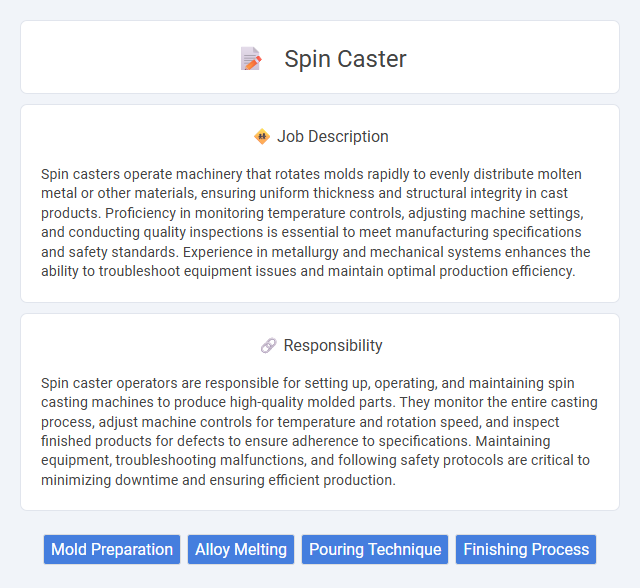
Spin casters operate machinery that rotates molds rapidly to evenly distribute molten metal or other materials, ensuring uniform thickness and structural integrity in cast products. Proficiency in monitoring temperature controls, adjusting machine settings, and conducting quality inspections is essential to meet manufacturing specifications and safety standards. Experience in metallurgy and mechanical systems enhances the ability to troubleshoot equipment issues and maintain optimal production efficiency.
Individuals with good manual dexterity and the ability to stand for extended periods are more likely to be suitable for a spin caster job. Those who may experience difficulty with repetitive motions or prolonged standing might find this role less compatible. The physical demands and attention to detail required suggest that people with a steady focus and reasonable physical stamina could find greater success in this position.
Qualification
A spin caster must possess strong skills in operating precision machinery and maintaining high-quality production standards in foundries or metal casting environments. Essential qualifications include mechanical aptitude, attention to detail, and experience with molten metal handling safety protocols. Certifications in industrial safety and familiarity with metallurgical processes enhance a spin caster's professional competency and job performance.
Responsibility
Spin caster operators are responsible for setting up, operating, and maintaining spin casting machines to produce high-quality molded parts. They monitor the entire casting process, adjust machine controls for temperature and rotation speed, and inspect finished products for defects to ensure adherence to specifications. Maintaining equipment, troubleshooting malfunctions, and following safety protocols are critical to minimizing downtime and ensuring efficient production.
Benefit
Spin caster jobs likely offer benefits such as skill development in operating precision machinery, which could enhance career prospects in manufacturing industries. Employees may experience increased job stability due to the demand for proficient technicians in metal casting and molding processes. The role might also provide opportunities for advancement and potentially competitive wages reflecting specialized expertise.
Challenge
Spin caster jobs likely present challenges related to maintaining precision and quality under fast-paced production demands. The probability of encountering equipment malfunctions or inconsistencies in material flow may require quick troubleshooting skills. Workers might need to adapt to strict safety protocols and consistently monitor processes to prevent defects.
Career Advancement
Spin caster operators develop expertise in managing centrifugal casting machines, enhancing precision in metal or plastic product manufacturing. Advancement opportunities include progression to supervisory roles, quality control specialists, or equipment maintenance technicians. Continuous skill development in machine operation and material science significantly boosts career growth within manufacturing industries.
Key Terms
Mold Preparation
Spin caster mold preparation requires precise cleaning and inspection to ensure optimal surface quality and defect-free casting. Proper application of release agents enhances mold durability and facilitates smooth metal flow during centrifugal casting. Detailed calibration of mold temperature and alignment directly impacts the final product's dimensional accuracy and structural integrity.
Alloy Melting
Spin caster operators specialize in alloy melting processes, precisely controlling the temperature and composition of molten metals to ensure the production of high-quality castings. They monitor melting furnaces, adjust heat sources, and maintain optimal alloy mixtures to achieve desired mechanical properties and surface finishes. Proficiency in metallurgical principles and safety protocols is essential to effectively manage alloy melting and produce defect-free spin cast components.
Pouring Technique
Spin casters utilize a precise pouring technique that ensures molten metal is evenly distributed into molds while rotating to form uniform, defect-free castings. This method minimizes air entrapment and solidification defects by controlling the flow rate and temperature of the liquid metal during the spinning process. Mastery of the pouring technique directly influences the structural integrity and surface finish of the final product in spin casting operations.
Finishing Process
The spin caster job in the finishing process involves the precise operation of spin casting machines to create detailed metal or plastic parts by injecting molten material into reusable molds. Skilled spin casters ensure smooth surfaces and accurate dimensions by controlling cooling rates and removing defects such as air bubbles or excess flash. Mastery of mold maintenance, material properties, and quality inspection is essential to optimize product durability and aesthetics during the finishing phase.
 kuljobs.com
kuljobs.com